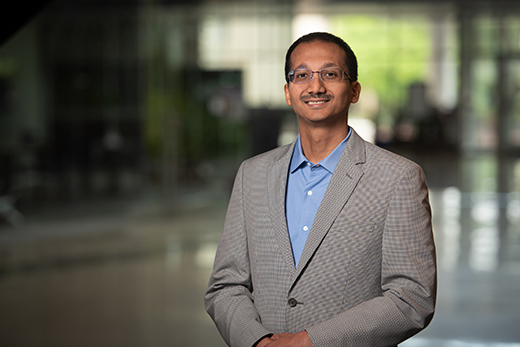Keystone Research Scholar is able to look toward the future of electrical engineering with help from donors
Electrical engineers impact a wide range of interests and industries, from the devices we store in our pockets, to the cars that we drive every day. Associate professor Behrooz Mirafzal, a recent Keystone Research Faculty Scholar, is showing graduate students ways electrical engineers can change the world through his research in the Power Electronics Research Laboratory.
Behrooz is the founder and director of the Power Electronics Research Laboratory at Kansas State University. The goal of his team is to perform research in the area of e-mobility, power electronic interfaces, cybersecurity via smart inverters and the power quality and grid resiliency of those technologies.
“Power electronics has diverse applications that influence the quality of modern life, such as sustainable energy conversion systems, smart cities, electric vehicles, etc. I got passionate about applications of power electronics when I was working in the R&D group of a motor-drive company, and at the same time, began my academic experience by teaching power electronics to undergraduate students as an adjunct professor in 2005,” Behrooz said. “Since then, my focus has been on power electronics and its applications on utility-interactive converters and e-mobility.”
Behrooz’s research team is looking toward the future and what is next to come for electrical engineers to see where the research needs to be to make the next big thing happen.
“The world is moving toward more electrification of automobile technologies. More mechanical systems are going to be replaced by electrical systems, like in aircraft and cars,” Behrooz said.
Behrooz and his team understand the importance of getting their information out into the world quickly and efficiently. “We create videos of some of our lab work and post them on our website to demonstrate our lab capabilities. Not many research groups have the hardware setup we have at the Power Electronics Research Lab at K-State,” Behrooz said.
The website and videos the team makes allow for more researchers and engineers to get familiar with the team’s ongoing activities.
As a recipient of the Keystone Scholar funding, Behrooz says the resources help the team “present our research outcome in major conferences. We are able to invite distinguished lecturers and engineers from research institutions and local companies, and to pay for over length publication fees of our research papers.”
Keystone Research Faculty Scholar awards are supported by private donations to help recruit and retain sought-after faculty. Having established outstanding research accomplishments, faculty members are nominated by their department head for these positions.
The funding allows for the small-scale impact of their work to be completed as well. Doing the small-scale research, such as the building of a model power grid, leads to significant research being completed faster. “Some lab setups and prototyping electric circuits to collect preliminary data need to be done on a small scale first, and that is why such support is important.” Behrooz said.
The power electronics and autonomous systems research group where all the experiments and work is done on K-State’s campus is the biggest in the state of Kansas and requires maintenance costs for daily activities besides the grants received from the National Science Foundation, Department of Energy, and some industries.
“Our group is extremely active, and sometimes to keep the lab running we are short in budget. Large grants are coming for student support and large equipment, but for small prototypes and maintenance, this support from donors and the KSU Foundation is very valuable. This support is also critical because it can be the difference between finishing a project or leaving it to sit,” Behrooz said.
As Behrooz’s team looks toward more ways that electrical engineers can empower the world, they also understand that a new age is close at hand, with more and more people looking toward sustainable solutions. With the research lab and the funding available, Behrooz’s team can turn their focus to this issue as well.
“We hope there are more electric vehicles and more sustainable energy systems being used in the future. All these technologies need power electronics that we are studying right now,” said Behrooz. “We are constantly working on more ways to grow and more ways to create a better environment as we do.”



